Presidential Finalist Henry Mack Shares His Vision for FGCU’s Future
The First of Four Finalists To Host Public Forums
Dr. Henry Mack spoke at 3 public forums on campus to engage with students, faculty and staff members.
April 18, 2023
Henry “Mack” Maklakiewicz, Ed.D. attended three public forums held in the Water School on April 18 to give students, faculty and staff insight into what he would bring to FGCU if chosen to be the incoming president.
He is the first of four finalists to attend public forums for the continuation of the fifth presidential search. Mack stated that he was not in the first pool of candidates. Lyndsay Rhodes, the faculty senate vice president and associate professor in the Department of Biological Sciences, moderated the 11 a.m. to 12 p.m. public forum.
Mack is the current senior chancellor in the Florida Department of Education in Tallahassee. He’s also a visiting professor at the University of Miami and an adjunct professor at Florida International University.
In Mack’s opening statement, he mentioned his desire to connect higher education to mobility, eliminating the obstacles that unique students would need to overcome to gain a higher education.
“My whole professional career has been dedicated to higher education itself and helping students achieve higher levels of mobility,” Mack said. “I have found an absolute love for helping students and families and adult learners and those with disabilities, achieve mobility.”
The Separation of Church and State at FGCU
The first question came from a student concerned that Mack would not separate “church and state” at FGCU and how he would ensure that separation is made at FGCU.
On Mack’s LinkedIn profile, he includes in his biography that he has “multiple graduate degrees in philosophy and theology from The Catholic University of America and a doctoral degree in higher education administration and the philosophy of education from the University of Miami.”
Mack emphasized that academic life and the pursuit of truth cannot occur if people impose viewpoints on others.
“Part of that is understanding the divide between public and private between sectarian and nonsectarian, which is a good thing and our founders are committed to that, as am I,” Mack said. “So let’s be very clear. There is no agenda here to impose any viewpoint on anybody other than cultivating the traditional aims of the university, which we can speak about at length, principle among that, for me, is helping you and everyone achieve the highest levels of rationality and intellectual autonomy as possible.”
He said he would be open to investing in forums and conferences to discuss these viewpoints across the university. He also said that creating a strategic plan that welcomes complicated topics.
BIPOC Community Support
Travell “T.O” Oakes, the assistant director of the Multicultural and Leadership Development Center, asked how Mack would ensure students within the BIPOC community will feel supported at FGCU, a predominantly white university.
Mack began by saying he’s passionate about helping the adult learner and disabled population.
“We have a situation in Florida where we have about 3 million adults that have low post-secondary attainment rates, if anything, no high school diploma or can barely read or write,” Mack said. “And 80% of that 3 million are the household heads of the 700,000 children living in poverty in the state of Florida. And we know those zip codes, we know those neighborhoods, we know who they are and we need to do better.”
He explained the statewide level strategies, with faith-based organizations and community-based organizations, to uplift access to higher education for the adult learner and disabled population.
Veteran Programs
Troy Bolivar, the director of Military and Veteran Success, wanted to know about Mack’s experience with collegiate veteran programs. Mack explained the implementation of entrepreneurship education and training for veterans, to encourage veterans to be innovators as well.
“I want to convert veteran experience into credit so that they can accelerate their time to degree completion,” Mack said.
Degree Completion and Last Name Transparency
An audience member asked Mack if “Mack” was his legal last name and asked why his degree conferral dates weren’t disclosed on his resume like the other candidates.
Mack stated that his legal last name is Maklakiewicz and wanted to shorten it for convenience. He also stated that his doctorate was obtained a year and a half ago and he is 42 years old.
Florida House Bill 999
Someone from the Campus Life department asked how Mack would act if HB 999 was passed, given the “looming” political climate. She listed off that Campus Life throws events for Juneteenth, Lunar New Year, Hispanic Heritage Month and mentioned the involvement of the Black Student Alliance.
“I wouldn’t first of all see anything from what you had mentioned. So none of those organizations would go away. None of them would be not resourced. None of them would be affected or impacted, in my view in any way, form or fashion, with or without the impending legislation,” Mack said.
He mentioned that a reform was made to HB 999 this morning and invited everyone to look at the latest iteration.
“In fact, if the legislation does pass, I think it would be very beneficial for us to elevate that work, to have conversations, public forums, symposiums open door policy, whatever it might be, for us to come to some mutual understanding of what the vision is for higher education in Florida as a result of the legislation,” Mack said.
The Future of Faculty Unions
Dr. Carolynne Gischel, president of FGCU’s UFF chapter, submitted an online comment about SB 256 and HB 1445, which will add obstacles for faculty to join the faculty union. She asked what impact FGCU would have if these efforts are successful.
Mack said he would rather not speculate on legislation that has or may not pass.
“The principle of shared governance is paramount in the success of the university,” Mack said. “So the idea that faculty would not be unionized is anathema to me.”
Reforms to Higher Education at FGCU
An online comment asked what reforms Mack believes are necessary in higher education for FGCU. Mack said that all students should understand Western literature traditions, but not at the exclusion of other diverse readings.
“I have argued in the City Journal piece that every graduate of every public university should be walking away with a common set of knowledge principles about the American Constitutional Republic,” Mack said.
Making Ethically Challenging Decisions
Dr. Chris Blakely, assistant vice president and dean of students in Campus Life and president of the Black Faculty and Staff Association, asked how Mack would decide on morally ethically challenging decisions.
Mack said he refers to data, either qualitative or quantitative, and to open discussions about the topic at hand.
“We don’t do ethics in isolation so if there was a decision that elevated itself to that level, you know, we ferret out the moral good together,” Mack said. “That’s not done unilaterally by someone.”
Why FGCU?
Student Jake M. asked what Mack’s value proposition is and why he chose FGCU.
“I am an innovator, disruptor, and a relationship builder,” Mack said. “I come ready made with relationships in Tallahassee for good or ill. I know people think what they think about being vis-à-vis [with] Tallahassee; however, being able to understand the legislature as decision-makers up there and how the process works is critical for any institution success.”
Allocation of Money For Faculty and Staff
A faculty member within the Lutgert College of Business mentioned that there’s always an assumption of an infinite pot of money that administration has to allocate. She asked how Mack would be transparent about that process. Mack said he would like it to be a collaborative effort.
“I don’t act unilaterally. I despise draconian sort of ways of management. I’m not a micromanager nor do I like to do things without talking,” Mack said.
The Future of FGCU
University Trustee Joseph Fogg asked about Mack’s future visions for the university.
Mack said he envisions expanding health sciences to include graduate opportunities and a medical school. He wants to expand engineering technology, IT and advanced manufacturing as well.
“I think a critical move and one that I’m ready to commit to would be increasing faculty pay and staff salaries [as soon as] we can get to that. I do think that we are under-resourcing our faculty. So that would be another bold move,” Mack said. “The third bold move, I think, would be seeing tighter industry partners across the curriculum, either by way of embedding certifications or expanding work-based learning or even delving into the apprenticeship world.”
Student Enrollment Growth and its Economic Impact
Jessica Marcolini, the assistant director of the Whitaker Center, asked how Mack will balance student enrollment growth with the university commitment to limit ecological impact on the community, as well as the commitment to maintain the academic integrity of students.
“So I think exploring modalities like blended learning,” Mack said. “And I’m not saying online education is the way to go. But how can we innovate there to reduce ecological impact?”
He said that expansion will have to occur in order to grow, even in Naples or other parts of Southwest Florida.
The Honors College
Minh Nguyen, intern dean of the Honors College and professor of philosophy, asked Mack’s contribution to academics and how he views the Honors College as a part of a regional public university.
Mack begins by saying that he hadn’t engaged in scholarships or research, he just loves teaching.
“[Honors students] have a higher level I think of duty back to the university to help uplift all of us,” Mack said. “So the integration of honors throughout the life, both intellectual academic, but also campus life, would be critical and that’s something that you know, that excites me a lot.”
Public comments are encouraged through a survey that will remain open until Friday, April 28 at 5 p.m. All submissions are subject to public records and will be reviewed by the Board of Trustees before final interviews take place on Thursday, May 4 in the Cohen Student Union.
































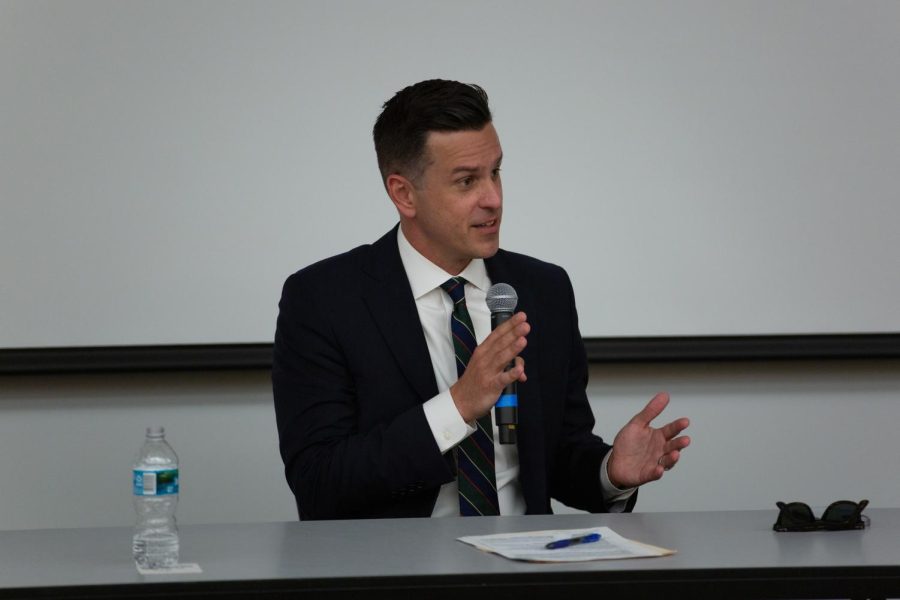
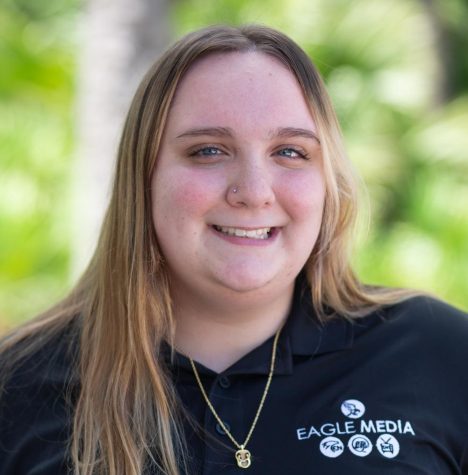
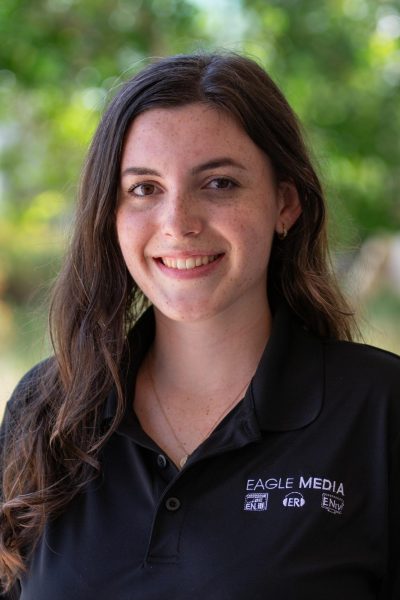


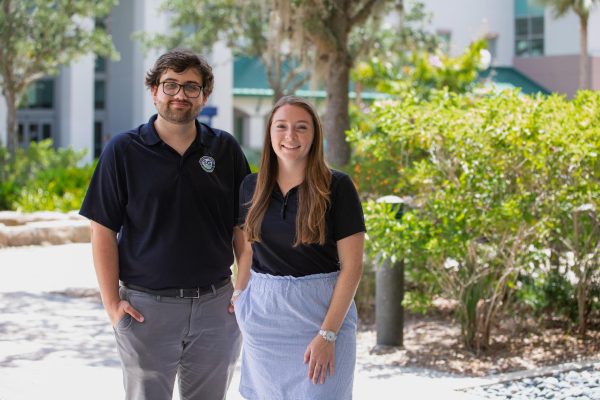

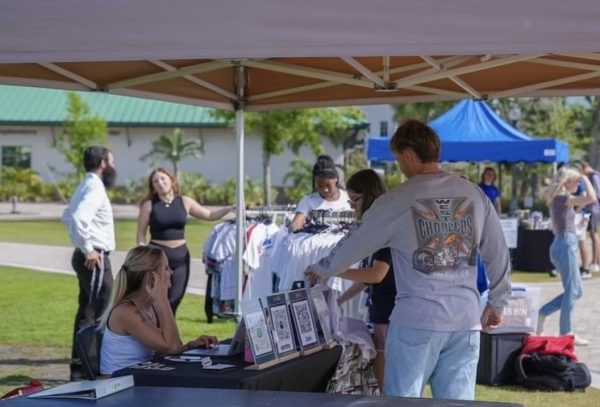
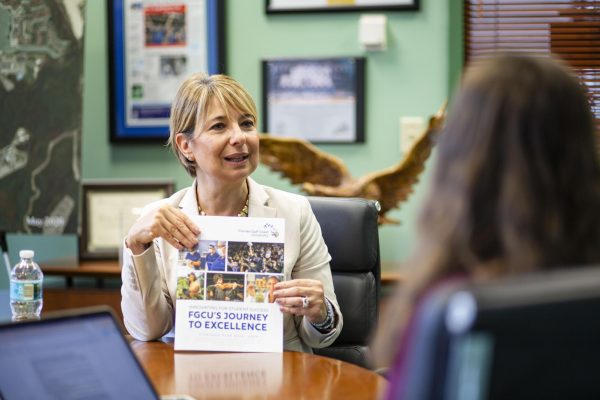
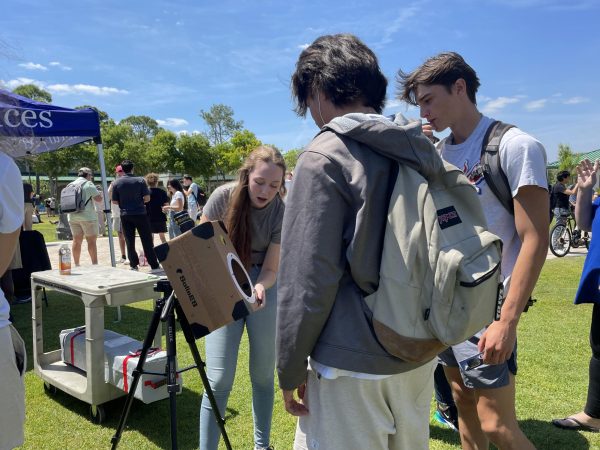
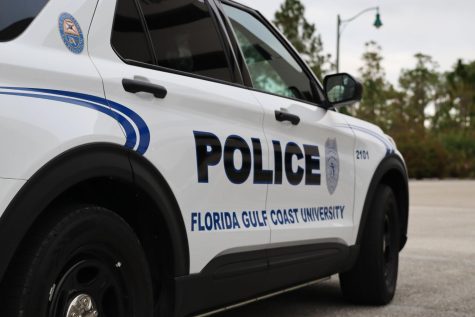


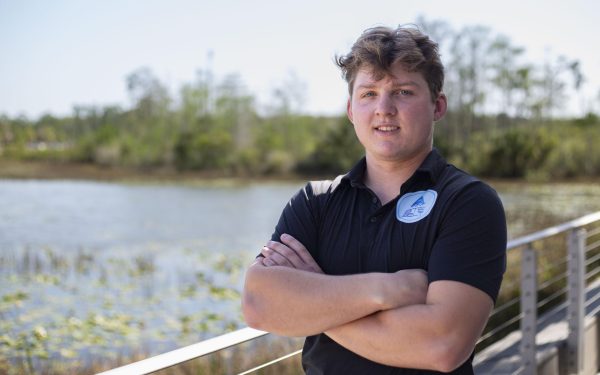
Jason • Apr 19, 2023 at 6:57 pm
Refreshing to see someone bold and poised to be a true leader and innovator for FGCU. It’s time to take it to the next level.
Jess • Apr 18, 2023 at 3:13 pm
Thank you for sharing a synopsis thus far! I attended the morning sessions virtually but greatly appreciated this run down.